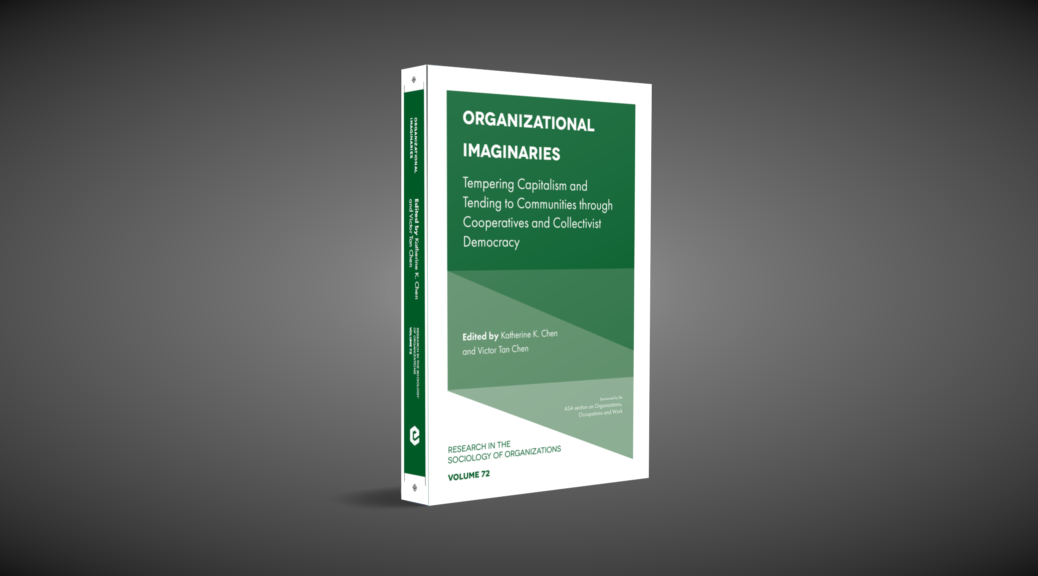When people think of starting a new business or organization, they often choose from a very narrow set of options: a corporation with investors, a nonprofit with a board of directors, and so on. But there is a much wider range of possibilities to choose from, as CUNY sociologist Katherine K. Chen and I explore in our new book Organizational Imaginaries: Tempering Capitalism and Tending to Communities through Cooperatives and Collectivist Democracy, just released by Emerald Publishing.
At one extreme, there is the for-profit company owned by investors and run by managers in a top-down fashion. At the other extreme, there are what the sociologist Joyce Rothschild calls “collectivist-democratic organizations.” This latter category includes worker cooperatives, consumer cooperatives, and social movements built on democratic principles. What these groups share is some form of collective ownership, a commitment to democratic decision-making, a communal spirit, and a focus on values and goals other than just making a profit.
Between these two poles, in turn, is a vast array of other organizations—from firms partially owned by employees (such as under an employee stock ownership plan), to privately certified social enterprises (such as B corporations), to various government-regulated models (such as credit unions). These are all viable options for entrepreneurs and organizers who want to found ventures not so fixated on profit-making and not so constrained by top-down bureaucracies. While well-known in European countries, such alternative organizational forms have a long history in the United States. Cooperatives, for instance, were once widely promoted by anticorporate activists and labor unions as a way of giving ordinary people a greater voice in the economy, as we describe.
The peer-reviewed academic papers collected in this volume describe many of these approaches to organizing. The introduction that Katherine Chen (no relation) and I wrote provides a big-picture overview and puts forward a broader way of thinking about organizational diversity. We argue that collectivist organizing can help societies deal more effectively and humanely not only with pressing crises like the current pandemic and economic downturn, but also with long-term challenges like automation.
For more details, check out our book page, which includes a table of contents with links to all the chapter abstracts. Below is the abstract to our introduction.
By Katherine K. Chen and Victor Tan Chen
This volume explores an expansive array of organizational imaginaries, or understandings of organizational possibilities, with a focus on how collectivist-democratic organizations offer alternatives to conventional for-profit managerial enterprises. These include worker and consumer cooperatives and other enterprises that, to varying degrees, (1) emphasize social values over profit; (2) are owned not by shareholders but by workers, consumers, or other stakeholders; (3) employ democratic forms of managing their operations; and (4) have social ties to the organization based on moral and emotional commitments. The contributors to this volume examine how these enterprises generate solidarity among members, network with other organizations and communities, contend with market pressures, and enhance their larger organizational ecosystems. In this introductory chapter, we put forward an inclusive organizational typology whose continuums account for four key sources of variation—values, ownership, management, and social relations—and argue that enterprises fall between these two poles of the collectivist-democratic organization and the for-profit managerial enterprise. Drawing from this volume’s empirical studies, we situate these market actors within fields of competition and contestation shaped not just by state action and legal frameworks, but also by the presence or absence of social movements, labor unions, and meta-organizations. This typology challenges conventional conceptualizations of for-profit managerial enterprises as ideals or norms, reconnects past models of organizing among marginalized communities with contemporary and future possibilities, and offers activists and entrepreneurs a sense of the wide range of possibilities for building enterprises that differ from dominant models.
Victor Tan Chen Victor Tan Chen is In The Fray's editor in chief and the author of Cut Loose: Jobless and Hopeless in an Unfair Economy. Site: victortanchen.com | Facebook | Twitter: @victortanchen
- Follow us on Twitter: @inthefray
- Comment on stories or like us on Facebook
- Subscribe to our free email newsletter
- Send us your writing, photography, or artwork
- Republish our Creative Commons-licensed content

